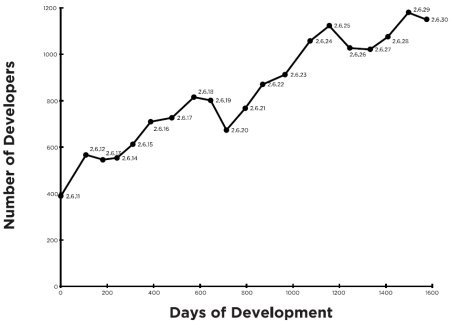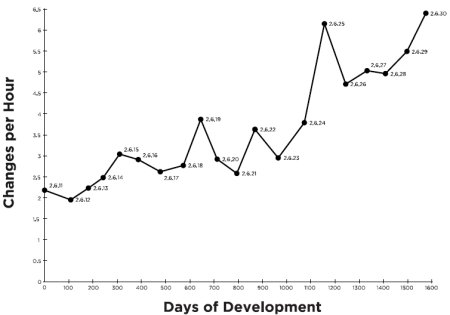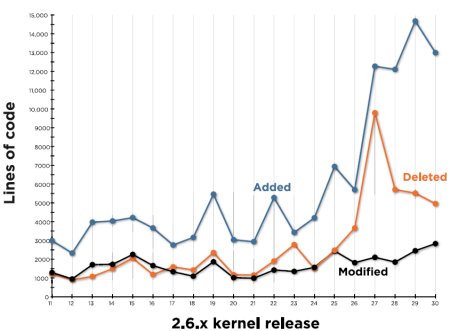Linux kernel developers increase by 10 percent
Aug 20, 2009 — by Eric Brown — from the LinuxDevices Archive — 1 viewsThe Linux Foundation has published an update to a study it first did last year regarding Linux kernel development. For each kernel release there has been a 10 percent increase in the number of contributing developers, delivering 2.7 million lines of code and a 42 percent increase in patch acceptance, the study reports.
"Who Writes Linux?" updates the April 2008 study, "Linux Kernel Development: How Fast is it Going, Who is doing it and Who is Sponsoring it?" It is written by original authors and kernel developers Jonathan Corbet and Greg Kroah-Hartman, as well as the Linux Foundation's VP of marketing Amanda McPherson.
The new statistics build upon the original study, which revealed that the number of Linux kernel developers has tripled since 2005, with many more companies contributing to the process. The update has been issued a week after the latest Linux 2.6.31-rc6 kernel maintenance release was announced by Linus Torvalds (see more farther below).
The rate of patch acceptance has increased by a whopping 42 percent since April 2008, reports the Linux Foundation (LF) study, resulting in 5.45 patches being accepted per hour. This is due in large part to the 10 percent increase in kernel contributors, said by the study to have been motivated by "new demand for Linux in emerging markets, such as netbooks, auto, and energy."
The report also links the accelerated development to the establishment of the new "Linux-next" tree staging area. Linux-next helps to accelerate development of the subsequent kernel cycle while development is still underway on the current release, says the non-profit foundation.

Number of developers per Linux kernel release
(Source: Linux Foundation)
(Click to enlarge)

Development days per Linux kernel release
(Source: Linux Foundation)
(Click to enlarge)
- Every Linux kernel is being developed by nearly 1,000 developers, working for more than 200 different corporations, making Linux the largest distributed software development project in the world
- Since 2008, the number of individual developers has increased by 10 percent.
- More than 70 percent of total contributions originate from developers working at technology companies, which are said to believe that participation in kernel development give them a competitive edge.
- The top five companies with developers participating in the Linux kernel development process are said to be Red Hat, Google, Novell, Intel, and IBM.
- A net of 2.7 million lines of code have been added since April 2008, with 10,923 lines of code added every day, representing a faster change rate than any other public software project.
- An average of 5,547 lines are removed every day, thereby improving quality and relevancy.

Kernel changes per release by type (added, modified, deleted)
(Source: Linux Foundation)
The top five contributors remain largely the same as in April 2008, although in a slightly different order, with David S. Miller leading the list. Falling off the list from last year are Linux superstar Andrew Morton, who has dropped to number 10, and Ralf Baechle, who has fallen to number seven. The new top five ranking includes real-time expert Ingo Molnar, as well as Takashi Iwai.
The top 5 Linux contributors, and their number of changes since April 2008, are said to be:
- David S. Miller — 2,239
- Ingo Molnar — 2,125
- Al Viro — 1,981
- Adrian Bunk — 1,883
- Takashi Iwai — 1,801
Linus Torvalds, meanwhile, has fallen off the top 30 list, says the LF. However, the study notes that the original Linux developer is still a major contributor. It also notes that the list does not include "merge commits," when one set of changes is merged into another, where Torvalds is said to play a key role. In addition, the growing acceleration of kernel development has increased the time Torvalds spends reviewing other kernel changes.
Linux 2.6.31-rc6 released
Last week Torvalds announced a stable rc6 version of the 2.6.31 kernel. This maintenance release is not nearly as newsworthy as the 2.6.30 kernel released in June or the 2.6.29 kernel announced in March, notes Torvalds. "There's nothing hugely interesting there," he writes, "although I'm personally gratified by the fact that I have a few more commits than usual. Even if they are all really small, it makes me feel useful."
Noting that "things do seem to be calming down," Torvalds characterizes the changes as representing "lots of small fixes all over, spread out fairly evenly." Half of the changes are said to be related to drivers, and there are roughly 10 percent each in "arch, fs, kernel, tools/perf, and 'rest'," he adds. Some of the more notable changes are said to include additional i915 displayport patches, a few perf-counter patches, and a null pointer fix.
Availability
The free Linux Foundation report update, "Who Writes Linux?" may be found in a PDF, here. Linus Torvalds' report on the 2.6.31 kernel on Linux.com should be here.
Corbet and Kroah-Hartman will participate on a panel at LinuxCon, discussing the new study and exploring the kernel development process. Torvalds and kernel community members James Bottomley, Arjan van de Ven, and Chris Wright will join them on LinuxCon's keynote panel on Sept. 21, at 2PM PT.
This article was originally published on LinuxDevices.com and has been donated to the open source community by QuinStreet Inc. Please visit LinuxToday.com for up-to-date news and articles about Linux and open source.